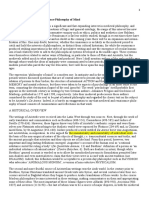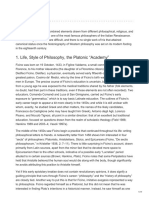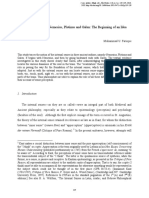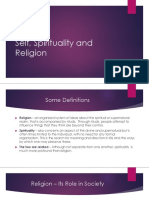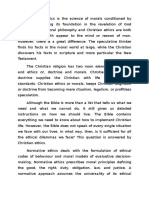Pletho Wiki
Pletho Wiki
Uploaded by
Anonymous nirGvSCopyright:
Available Formats
Pletho Wiki
Pletho Wiki
Uploaded by
Anonymous nirGvSOriginal Description:
Copyright
Available Formats
Share this document
Did you find this document useful?
Is this content inappropriate?
Copyright:
Available Formats
Pletho Wiki
Pletho Wiki
Uploaded by
Anonymous nirGvSCopyright:
Available Formats
http://en.wikipedia.
org/wiki/Gemistus_Pleth o Gemistus Pletho
From Wikipedia, the free encyclopedia
Portrait of Gemistus Pletho, detail of a fresco by acquaintance Benozzo Gozzoli, Palazzo Medici Riccardi, Florence.
One of Plethon's manuscripts, in Greek, written in the early 15th century
Part of a series on
Plato
Early life Works Platonism Epistemology Idealism / Realism Theory of Forms Form of the Good Third man argument Euthyphro dilemma Five regimes Philosopher king
Allegories and metaphors Ring of Gyges The cave The divided line The sun Ship of state Myth of Er The chariot
Related articles The Academy in Athens Socratic problem Commentaries on Plato Middle Platonism Neoplatonism Neoplatonism and Christianity
vde
Georgius Gemistus (Greek: ; ca. 13551452/1454) later called Plethon or Pletho was a Greek scholar of Neoplatonic philosophy. He was one of the chief pioneers of the revival of Greek learning in Western Europe. In the dying years of the Byzantine Empire, he advocated a return to the Olympian gods of the ancient world.[1]
He re-introduced Plato's thoughts to Western Europe during the 1438 - 1439 Council of Florence, a failed attempt to reconcile the East-West schism. Here Pletho met and influenced Cosimo de' Medici to found a new Platonic Academy, which, under Marsilio Ficino, would proceed to translate into Latin all Plato's works, the Enneads of Plotinus, and various other Neoplatonist works.
Contents
[hide]
1 Biography o 1.1 Early life and study o 1.2 Teacher and magistrate in Mistra o 1.3 Lecturing in Florence o 1.4 Mystery school 2 Writings o 2.1 Reform of the Peloponnese o 2.2 De Differentiis o 2.3 Nmoi o 2.4 Summary o 2.5 Other works 3 See also 4 References 5 Sources 6 External links
[edit] Biography
[edit] Early life and study
George Gemistos was born some time after 1355, probably in Constantinople.[2] As a young man he went to study at Adrianopolis, by now the Turkish capital following its capture by the Ottoman Sultan Murad I in 1365. Adrianopolis was now a centre of learning modelled by Murat on the caliphates of Cairo and Baghdad.[2] Here he began to study Plato, and admired the philosopher so much that late in life he took the similar-meaning name Plethon.[3] In c1407 Gemistos left Adrianopolis and travelled through Cyprus, Palestine and other places,[2] finally settling in Mistra,[4] in the Despotate of Morea.
[edit] Teacher and magistrate in Mistra
In Mistra he taught and wrote philosophy, astronomy, history and geography, and compiled digests of many classical writers. His pupils included Basilios Bessarion and George Scholarius (later to become Patriarch of Constantinople and Plethon's enemy). He was made chief magistrate by Theodore II.[2] Plethon was the author of De Differentiis, a detailed comparison between Plato and Aristotles' conceptions of God. Scholarios later defended Aristotle and convinced the Byzantine emperor Manuel II Palaiologos that Plethon's support for Plato amounted to heresy. Manuel had
Plethon confined in Mistra, though he remained somewhat of a celebrity. In 1415 and 1418[4] he wrote pamphlets to Theodore and Manuel describing how the Empire could be reorganized according to Plato's Republic, with political, legal and economic reforms, and gained even greater reputation as a legal thinker, with rumours that he carried entire legal codes in his memory.[2] He also wrote a Summary of the Doctrines of Zoroaster and Plato, which detailed his own eclectic polytheistic beliefs. These works did not help to clear him of the charge of heresy. He also wrote about the condition of the Peloponnesus, compiled several volumes of excerpts from ancient authors, and wrote a number of works on geography, music, and other subjects.
[edit] Lecturing in Florence
In 1428 Gemistos was consulted by Emperor John VIII on the issue of unifying the Greek and Latin churches, and advised that both delegations should have equal voting power.[2] Byzantine scholars had been in contact with their counterparts in Western Europe since the time of the Latin Empire, and especially since the Byzantine Empire had begun to ask for Western European help against the Ottomans in the 14th century. Western Europe had some access to ancient Greek philosophy through the Roman Catholic Church and the Muslims, but the Byzantines had many documents and interpretations that the Westerners had never seen before. Byzantine scholarship became more fully available to the West after 1438, when Byzantine emperor John VIII Palaeologus attended the Council of Ferrara, later known as the Council of Florence, to discuss a union of the Orthodox and Catholic churches. Despite being a secular philosopher, Plethon was chosen to accompany John VIII on the basis of his renowned wisdom and morality. Other delegates included Plethon's former students Bessarion, Mark Eugenikos and Scholarios.[5] As a secular scholar, Plethon was often not needed at the council. Instead, at the invitation of some Florentine humanists he set up a temporary school to lecture on the difference between Plato and Aristotle. Few of Plato's writings were studied in the Latin West at that time, [6] and he essentially reintroduced much of Plato to the Western world, shaking the domination which Aristotle had come to exercise over Western European thought in the high and later middle ages. Cosimo de' Medici attended these lectures and was inspired to found the Accademia Platonica in Florence, where Italian students of Plethon continued to teach after the conclusion of the council.[5] Because of this, Plethon is considered one of the most important influences on the Italian Renaissance. Marsilio Ficino, the Florentine humanist and the first director of the Accademia Platonica, paid Plethon the ultimate honour, calling him 'the second Plato', while Cardinal Bessarion speculated as to whether Plato's soul occupied his body. Plethon may also have been the source for Ficino's Orphic system of natural magic.[2] While still in Florence, Plethon summarised his lectures in a volume titled On the Differences of Aristotle from Plato, commonly called De Differentiis. George Scholarius responded with a Defence of Aristotle, which elicited Plethon's subsequent Reply. Expatriate Byzantine scholars and later Italian humanists continued the argument.[5]
[edit] Mystery school
On his return to the Peloponnese, Gemistos founded a school. He taught polytheism as opposed to monotheism, and some of his students prayed to statues of the pagan deities.[2]
Pletho died in Mistra in 1452, or in 1454, according to J. Monfasani. In 1466, some of his Italian disciples, headed by Sigismondo Pandolfo Malatesta, stole his remains from Mistra and interred them in the Tempio Malatestiano in Rimini, "so that the great Teacher may be among free men".
[edit] Writings
[edit] Reform of the Peloponnese
Believing that the Peloponnesians were direct descendents of the ancient Hellenes, Pletho rejected Justinian's idea of a universal Empire in favour of recreating the Hellenistic civilization, the zenith of Greek influence,[7] In his 1415 and 1418 pamphlets urged Manuel II and his son Theodore to turn the peninsula into a cultural island with a new constitution of strongly centralised monarchy advised by a small body of middle-class educated men. The army must be composed only of professional native Greek soldiers, who would be supported by the taxpayers, or "Helots" who would be exempt from military service. Land was to be publicly owned, and a third of all produce given to the state fund; incentives would be given for cultivating virgin land. Trade would be regulated and the use of coinage limited, barter instead being encouraged; locally available products would be supported over imports. Mutilation as a punishment would be abolished, and chain gangs introduced. Homosexuals, as sexual deviants, would be burnt at the stake. In these pamphlets Plethon touched little on religion, although he expressed disdain for monks, who "render no service to the common good". He vaguely prescribed three religious principles: belief in a supreme being; that this being has concern for mankind; and that it is uninfluenced by gifts or flattery. Manuel and Theodore did not act on any of these reforms.[4]
[edit] De Differentiis
In De Differentiis Plethon compares Aristotle's and Plato's conceptions of God, arguing that Plato credits God with more exalted powers as "creator of every kind of intelligible and separate substance, and hence of our entire universe", while Aristotle has Him as only the motive force of the universe; Plato's God is also the end and final cause of existence, while Aristotle's God is only the end of movement and change.[5] Plethon derides Aristotle for discussing unimportant matters such as shellfish and embryos while failing to credit God with creating the universe,[5] for believing the heavens are composed of a fifth element, and for his view that contemplation was the greatest pleasure; the latter aligned him with Epicurus, Plethon argued, and he attributed this same pleasure-seeking to monks, whom he accused of laziness.[2] Later, in response to Gennadius' Defence of Aristotle, Plethon argued in his Reply that Plato's God was more consistent with Christian doctrine than Aristotle's, and this, according to Darien DeBolt, was probably in part an attempt to escape suspicion of heterodoxy.[5]
[edit] Nmoi
After his death, Plethon's Nmon singraf ( ) or Nmoi ( "Book of Laws") was discovered. He had been compiling it throughout most of his adult life, and it became famous as the most heretical of his works, detailing his esoteric beliefs.[2] It came into the possession of Princess Theodora, wife of Demetrios, despot of Morea. Theodora sent the manuscript to Scholarius, now Gennadius II, Patriarch of Constantinople, asking for his
advice on what to do with it; he returned it, advising her to destroy it. Morea was under invasion from Sultan Mehmet II, and Theodora escaped with Demetrios to Constantinople where she gave the manuscript back to Gennadius, reluctant to destroy the only copy of such a distinguished scholar's work herself. Gennadius burnt it in 1460, however in a letter to the Exarch Joseph (which still survives) he details the book, providing chapter headings and brief summaries of the contents.[5] It seemed to represent a merging of Stoic philosophy and Zoroastrian mysticism, and discussed astrology, daemons and the migration of the soul. He recommended religious rites and hymns to petition the classical gods, such as Zeus, whom he saw as universal principles and planetary powers. Man, as relative of the gods, should strive towards good. Plethon believed the universe has no beginning or end in time, and being created perfect, nothing may be added to it. He rejected the concept of a brief reign of evil followed by perpetual happiness, and held that the human soul is reincarnated, directed by the gods into successive bodies to fulfill divine order. This same divine order, he believed, governed the organisation of bees, the foresight of ants and the dexterity of spiders, as well as the growth of plants, magnetic attraction, and the amalgamation of mercury and gold.[2] Plethon drew up plans in his Nmoi to radically change the structure and philosophy of the Byzantine Empire in line with his interpretation of Platonism. The new state religion was to be founded on a hierarchical pantheon of Pagan Gods, based largely upon the ideas of Humanism prevalent at the time, incorporating themes such as rationalism and logic. As an ad-hoc measure he also supported the reconciliation of the two churches in order to secure Western Europe support against the Ottomans.[8] He also proposed more practical, immediate measures, such as rebuilding the Hexamilion, the ancient defensive wall across the Isthmus of Corinth, which had been breached by the Ottomans in 1423. The political and social elements of his theories covered the creation of communities, government (he promoted benevolent monarchy as the most stable form), land ownership (land should be shared, rather than individually owned), social organisation, families, and divisions of sex and class. He believed that labourers should keep a third of their produce, and that soldiers should be professional. He held that love should be private not because it is shameful, but because it is sacred.[2]
[edit] Summary
Plethon's own summary of the Nmoi also survived, amongst manuscripts held by his former student Bessarion. This summary, titled Summary of the Doctrines of Zoroaster and Plato, affirms the existence of a pantheon of gods, with Zeus as supreme sovereign, containing within himself all being in an undivided state; his eldest child, motherless, is Poseidon, who created the heavens and rules all below, ordaining order in the universe. Zeus' other children include an array of "supercelestial" gods, the Olympians and Tartareans, all motherless. Of these Hera is third in command after Poseidon, creatress and ruler of indestructible matter, and the mother by Zeus of the heavenly gods, demi-gods and spirits. The Olympians rule immortal life in the heavens, the Tartareans mortal life below, their leader Kronos ruling over mortality altogether. The eldest of the heavenly gods is Helios, master of the heavens here and source of all mortal life on earth. The gods are responsible for much good and no evil, and guide all life towards divine order. Plethon describes the creation of the universe as being perfect and outside of time, so that the universe remains eternal, without beginning or end. The soul of man, like the gods is immortal and essentially good, and is reincarnated in successive mortal bodies for eternity at the direction of the gods.[5]
[edit] Other works
Many of Plethon's other works still exist in manuscript form in various European libraries. Most of Pletho's works can be found in J. P. Migne, Patrologia Graeca, collection; for a complete list see Fabricius, Bibliotheca Graeca (ed. Harles), xii.
[edit] See also
Christian heresy Byzantine scholars in the Renaissance
[edit] References
1. 2. 3. 4. 5. 6. ^ Richard Clogg, Woodhouse, Christopher Montague, fifth Baron Terrington (19172001), Oxford Dictionary of National Biography, Oxford University Press, Jan 2005 ^ a b c d e f g h i j k l Merry, Bruce (2002) "George Gemistos Plethon (c. 1355/60 1452)" in Amoia, Alba & Knapp, Bettina L., Multicultural Writers from Antiquity to 1945: A Bio-Bibliographical Sourcebook. Greenwood Publishing Group. ^ : "the full", pronounced [plion]. Plethon is also an archaic translation of the Greek /yemists ("full, stuffed") ^ a b c Burns, James Henderson (ed.) (1991). The Cambridge History of Medieval Political Thought C. 350 - C. 1450. Cambridge University Press. pp. 778. ^ a b c d e f g h DeBolt, Darien C. (1998) George Gemistos Plethon on God: Heterodoxy in Defence of Orthodoxy. A paper delivered at the Twentieth World Congress of Philosophy, Boston, Mass. Retrieved 2008-11-20. ^ Timaeus in the partial translation of Calcidius was available; Henricus Aristippus' 12th century translation of the Meno and Phaedo was available, but obscure; Leonardo Bruni's translations of the Phaedo, Apology, Crito and Phaedrus appeared only shortly before Plethon's visit. (DeBolt) ^ James Henderson Burns, The Cambridge history of medieval political thought c. 350-c. 1450, Cambridge University Press, 1988 ^ Journal of Hellenic Studies, Vol. 7, p.356
7. 8.
[edit] Sources
This article incorporates text from a publication now in the public domain: Chisholm, Hugh, ed (1911). Encyclopdia Britannica (11th ed.). Cambridge University Press. Darien C. DeBolt Paper on De Differentiis Brown, Alison M., 'Platonism in fifteenth century Florence and its contribution to early modern political thought', Journal of Modern History 58 (1986), 383-413. Harris, Jonathan, 'The influence of Plethon's idea of fate on the historian Laonikos Chalkokondyles', in Proceedings of the International Congress on Plethon and his Time, Mystras, 2629 June 2002, ed. L.G. Benakis and Ch.P. Baloglou (Athens: Society for Peloponnesian and Byzantine Studies, 2004), pp. 21117 Keller, A., 'Two Byzantine scholars and their reception in Italy', Journal of the Warburg and Courtauld Institutes 20 (1957), 363-70
Mandilas, Kostas, Georgius Gemistos Plethon (Athens 1997)* ISBN 960-7748-08-5 Masai, F., Plthon et le platonisme de Mistra (Paris, 1956) Monfasani, John, 'Platonic paganism in the fifteenth century', in John Monfasani, Byzantine Scholars in Renaissance Italy: Cardinal Bessarion and Other migrs, (Aldershot, 1995), no. X Runciman, Steven, The Last Byzantine Renaissance (Cambridge, 1970) Setton, Kenneth M. 'The Byzantine background to the Italian Renaissance', Proceedings of the American Philosophical Society, 100 (1956), 1-76. Tambrun, B. Plthon. Le retour de Platon, Paris, Vrin, 2006, 300 p. Tambrun-Krasker, B., Georges Gmiste Plthon, Trait des vertus. dition critique avec introduction, traduction et commentaire, Corpus Philosophorum Medii Aevi, Philosophi Byzantini 3, Athens-The Academy of Athens, E. J. Brill, Leiden, 1987. Tambrun-Krasker, B., Magika logia tn apo Zoroastrou magn, Georgiou Gemistou Plthnos Exgsis eis ta auta logia. Oracles chaldaques. Recension de Georges Gmiste Plthon. Edition critique avec introduction, traduction et commentaire par B. Tambrun-Krasker. La recension arabe des Magika logia par M. Tardieu, Corpus Philosophorum Medii Aevi, Philosophi Byzantini 7, Athens-The Academy of Athens, Paris, Librairie J. Vrin, Bruxelles, ditions Ousia, 1995, LXXX+187 p. Tambrun, B., Pletho (article) in: W.J. Hanegraaff, A. Faivre, R. van den Broek, J.P. Brach ed., Dictionary of Gnosis and Western Esotericism, Leiden, E.J. Brill, 2005, 2006. Vassileiou, Fotis & Saribalidou, Barbara, Short Biographical Lexicon of Byzantine Academics Immigrants in Western Europe, 2007. Woodhouse, C.M., George Gemistus Plethon - The Last of the Hellenes (Oxford, 1986) "Georgius Gemistus Plethon". Catholic Encyclopedia. New York: Robert Appleton Company. 1913.
[edit] External links
http://lem.vjf.cnrs.fr/fichecerl/tambrun.html http://halshs.archives-ouvertes.fr/halshs-00293398/fr/ http://halshs.archives-ouvertes.fr/halshs-00293417/fr/ Works by or about Gemistus Pletho in libraries (WorldCat catalog)
You might also like
- Reasoning With God - Reclaiming Shari'ah in The Modern Age (PDFDrive) PDFDocument557 pagesReasoning With God - Reclaiming Shari'ah in The Modern Age (PDFDrive) PDFKhalil Malik100% (1)
- Plato, Byzantium and The Italian RenaissanceDocument15 pagesPlato, Byzantium and The Italian RenaissanceNichifor TanaseNo ratings yet
- This Content Downloaded From 162.247.5.10 On Tue, 08 Jun 2021 06:50:40 UTCDocument10 pagesThis Content Downloaded From 162.247.5.10 On Tue, 08 Jun 2021 06:50:40 UTCaurennosNo ratings yet
- R. J. Crum, Roberto Martelli, The Council of Florenece and Medici Palace ChapelDocument16 pagesR. J. Crum, Roberto Martelli, The Council of Florenece and Medici Palace Chapelgenoveva011No ratings yet
- Ficino and Golden ChainDocument2 pagesFicino and Golden ChainFelipe AguirreNo ratings yet
- Interview With An Ethical LeaderDocument7 pagesInterview With An Ethical LeaderKathryn StacyNo ratings yet
- Georgius Gemistos PlethonDocument10 pagesGeorgius Gemistos PlethonLorenzo BuezaNo ratings yet
- Platonism and Neoplatonism The Oxford EDocument9 pagesPlatonism and Neoplatonism The Oxford ElistboxNo ratings yet
- Plato S Influence On Gerogios Gemistos PDocument20 pagesPlato S Influence On Gerogios Gemistos PtreebeardsixteensNo ratings yet
- Nectar in Renaissance Esotericism: Ficino, Pico, Agrippa, and BrunoDocument5 pagesNectar in Renaissance Esotericism: Ficino, Pico, Agrippa, and BrunojuliointactaNo ratings yet
- Plethon and The Notion of PaganismDocument3 pagesPlethon and The Notion of PaganismgermanschultzeNo ratings yet
- Andreas PalaiologosDocument11 pagesAndreas PalaiologosBogo HogoNo ratings yet
- John Monfasani The Renaissance Plato Aristotle Controversy and The Court of Matthias RexDocument21 pagesJohn Monfasani The Renaissance Plato Aristotle Controversy and The Court of Matthias RexmarlonumitNo ratings yet
- Miguel Á. Granada (Mersenne's Critique of Bruno)Document25 pagesMiguel Á. Granada (Mersenne's Critique of Bruno)mmhaccrNo ratings yet
- Francesco PatriziDocument14 pagesFrancesco PatriziIvana MajksnerNo ratings yet
- (Proof of Assyrians in West Africa) HAUSA KEBBI KINGS LISTDocument2 pages(Proof of Assyrians in West Africa) HAUSA KEBBI KINGS LISTDarius KD FrederickNo ratings yet
- Cardinal Bessarion's Library CollectionDocument41 pagesCardinal Bessarion's Library CollectionLaura BolickNo ratings yet
- The Cosmology of Giordano Bruno (1548-1600) Author(s) : Dorothea Waley Singer Source: Isis, Vol. 33, No. 2 (Jun., 1941), Pp. 187-196 Published By: On Behalf of Stable URL: Accessed: 15/06/2014 02:32Document11 pagesThe Cosmology of Giordano Bruno (1548-1600) Author(s) : Dorothea Waley Singer Source: Isis, Vol. 33, No. 2 (Jun., 1941), Pp. 187-196 Published By: On Behalf of Stable URL: Accessed: 15/06/2014 02:32Abhishek ChatterjeeNo ratings yet
- Kristeller Atheism PDFDocument12 pagesKristeller Atheism PDFAnonymous B1QehLANo ratings yet
- Platon Si Academia Veche de ZellerDocument680 pagesPlaton Si Academia Veche de ZellerDan BrizaNo ratings yet
- James Hankins Marsilio Ficino Part IDocument7 pagesJames Hankins Marsilio Ficino Part IboyowitzNo ratings yet
- Herrera BreanneDocument0 pagesHerrera BreannesolmiNo ratings yet
- Adamson 2006 Vision - Light - and - Color - in - Alkindi - Ptolemy - and - The - Ancient - Commentators PDFDocument30 pagesAdamson 2006 Vision - Light - and - Color - in - Alkindi - Ptolemy - and - The - Ancient - Commentators PDFlamiabaNo ratings yet
- Plato's Cave Parable and The Developement of Modern MathematicsDocument32 pagesPlato's Cave Parable and The Developement of Modern MathematicsSardanapal ben EsarhaddonNo ratings yet
- Plato PDFDocument23 pagesPlato PDFLuke StoneNo ratings yet
- Ficino's Praise of Georgios Gemistos PlethonDocument10 pagesFicino's Praise of Georgios Gemistos PlethonaguirrefelipeNo ratings yet
- Plato's Phaedrus R. Hackforth Plato's Phaedrus. Translated With Introduction and Commentary. Tate, JDocument3 pagesPlato's Phaedrus R. Hackforth Plato's Phaedrus. Translated With Introduction and Commentary. Tate, JCy PercutioNo ratings yet
- Renaissance Thought - The Classic, Scholastic, and Humanistic Strains Author Kristeller, Paul OskarDocument214 pagesRenaissance Thought - The Classic, Scholastic, and Humanistic Strains Author Kristeller, Paul OskarHaiyi HuangNo ratings yet
- Opus Imperfectum MatthaeumDocument13 pagesOpus Imperfectum MatthaeumMorneBezuidenhout100% (1)
- Byzantine Philosophers of The 15 TH Century On IdentityDocument34 pagesByzantine Philosophers of The 15 TH Century On IdentityAdam Lorde-of HostsNo ratings yet
- Filip Karfik - Marsilio Ficino On The Maker of The Universe PDFDocument22 pagesFilip Karfik - Marsilio Ficino On The Maker of The Universe PDFblavskaNo ratings yet
- 0402 Raphael's LetterDocument5 pages0402 Raphael's Lettercccc gggg oooNo ratings yet
- Giordano Bruno - de Imenso, de Minimo and de Infinito PDFDocument27 pagesGiordano Bruno - de Imenso, de Minimo and de Infinito PDFBranko von LatinčićNo ratings yet
- Socrates' Conception of TechneDocument70 pagesSocrates' Conception of TechneNaci Emre Boran100% (1)
- TroubadoursDocument7 pagesTroubadoursBrodyNo ratings yet
- James Hankins - The Baron ThesisDocument31 pagesJames Hankins - The Baron ThesisdchiarettiNo ratings yet
- Intro Commentary On Plato's Timaeus ProclusDocument10 pagesIntro Commentary On Plato's Timaeus ProclusdoppiapresaNo ratings yet
- History - Medieval and Renaissance Philosophy of MindDocument6 pagesHistory - Medieval and Renaissance Philosophy of Mindgauchofiero99No ratings yet
- Northern RenaissanceDocument19 pagesNorthern Renaissanceapi-337301413No ratings yet
- Why Should We Read SpinozaDocument17 pagesWhy Should We Read Spinozaalbertuss.stNo ratings yet
- Orphism and Grafitty From OlbiaDocument11 pagesOrphism and Grafitty From OlbiaРужа Попова100% (1)
- Northern Renaissance ArtDocument69 pagesNorthern Renaissance Artphapalla101100% (2)
- Telescope and ImaginationDocument29 pagesTelescope and ImaginationJabłkowyBałwanekNo ratings yet
- Catalogue of the Books Presented by Edward Capell to the Library of Trinity College in CambridgeFrom EverandCatalogue of the Books Presented by Edward Capell to the Library of Trinity College in CambridgeNo ratings yet
- Salvator Rosa and PhilosophyDocument17 pagesSalvator Rosa and PhilosophyjkpiovanoNo ratings yet
- Plato - Stanford.edu Marsilio FicinoDocument17 pagesPlato - Stanford.edu Marsilio Ficinopsnapplebee100% (1)
- Ševčenko, I. (1955) - Intellectual Repercussions of The Council of Florence. Church History, 24 (04), 291.Document34 pagesŠevčenko, I. (1955) - Intellectual Repercussions of The Council of Florence. Church History, 24 (04), 291.Vangelis KostNo ratings yet
- The Internal Senses in Nemesius Plotinus PDFDocument21 pagesThe Internal Senses in Nemesius Plotinus PDFPaloma Hernández-RubioNo ratings yet
- Bloch2009 Robert Grosseteste's Conclusiones and The Commentary On The Posterior AnalyticsDocument28 pagesBloch2009 Robert Grosseteste's Conclusiones and The Commentary On The Posterior AnalyticsGrossetestis StudiosusNo ratings yet
- Kristeller - Marsilio Ficino As Beginning Student of PlatoDocument15 pagesKristeller - Marsilio Ficino As Beginning Student of PlatoAléxandros Próodos100% (2)
- Agamben - The Eternal Return and The Paradox of PassionDocument9 pagesAgamben - The Eternal Return and The Paradox of PassionDavid ColNo ratings yet
- Biblia Hazlie - Leo TaxilDocument1 pageBiblia Hazlie - Leo TaxilcrispreotesoiuNo ratings yet
- Taubes Liberalism PDFDocument24 pagesTaubes Liberalism PDFBruno FernandesNo ratings yet
- Dionysos, Divine Space and Dopamine: A Cognitive Approach To The Greek TheatreDocument17 pagesDionysos, Divine Space and Dopamine: A Cognitive Approach To The Greek TheatreastefNo ratings yet
- The Missing Speech of The Absent Fourth Reader Response and Plato's Timaeus-CritiasDocument23 pagesThe Missing Speech of The Absent Fourth Reader Response and Plato's Timaeus-CritiasJhonatan RivasNo ratings yet
- Suarez On The Reduction of Categorical RelationsDocument24 pagesSuarez On The Reduction of Categorical RelationsGabriel de AlmeidaNo ratings yet
- Pythagoras Foundation Newsletter 22 2017Document76 pagesPythagoras Foundation Newsletter 22 2017Vitali TurenkoNo ratings yet
- Robert Fludd BioDocument11 pagesRobert Fludd BioOmorogah HagmoNo ratings yet
- GILL, Joseph, Personalities of The Council of Florence (Cardinal Bessarion)Document10 pagesGILL, Joseph, Personalities of The Council of Florence (Cardinal Bessarion)Cristian ManolacheNo ratings yet
- The Mathematical and Philosophical Works of The Right Reverend John WilkinsDocument591 pagesThe Mathematical and Philosophical Works of The Right Reverend John Wilkinsrollypollyintraining100% (1)
- Soliloquies in England and Later Soliloquies (Barnes & Noble Digital Library)From EverandSoliloquies in England and Later Soliloquies (Barnes & Noble Digital Library)Rating: 5 out of 5 stars5/5 (2)
- My Catholic Family Eps 5comDocument22 pagesMy Catholic Family Eps 5comAnonymous nirGvS100% (1)
- Eucharist Eps 13com (3) .Doc - RevDocument17 pagesEucharist Eps 13com (3) .Doc - RevAnonymous nirGvSNo ratings yet
- Dear Heavenly FatherDocument2 pagesDear Heavenly FatherAnonymous nirGvSNo ratings yet
- Danilo KalafatovicDocument2 pagesDanilo KalafatovicAnonymous nirGvSNo ratings yet
- Libretto Definitivo - ENGDocument4 pagesLibretto Definitivo - ENGAnonymous nirGvSNo ratings yet
- HTTPDocument7 pagesHTTPAnonymous nirGvSNo ratings yet
- Post 2006 Veliki Petek enDocument5 pagesPost 2006 Veliki Petek enAnonymous nirGvSNo ratings yet
- Kissinger: Bosnia Should Be Split Into Three Parts: Article IndexDocument1 pageKissinger: Bosnia Should Be Split Into Three Parts: Article IndexAnonymous nirGvSNo ratings yet
- Philosophy of LawDocument6 pagesPhilosophy of LawDeanne ClaireNo ratings yet
- Al - FarabiDocument10 pagesAl - FarabiMahnoor HaiderNo ratings yet
- QuoteCoil, Instant Quote SearchDocument2 pagesQuoteCoil, Instant Quote Searchsait_hakkim90No ratings yet
- Nationalism Internationalism: Theory and Practice of Marxist Nationality Policy From Marx and Engels To Lenin and The Communist Party of PolandDocument331 pagesNationalism Internationalism: Theory and Practice of Marxist Nationality Policy From Marx and Engels To Lenin and The Communist Party of PolandAnonymous Pu2x9KVNo ratings yet
- BA (Prog.) 2020 SEM. VI IV II (CBCS)Document16 pagesBA (Prog.) 2020 SEM. VI IV II (CBCS)new traineeeNo ratings yet
- Analayo - The Luminous MindDocument42 pagesAnalayo - The Luminous MindWuNo ratings yet
- 23 Natural ProsperityDocument52 pages23 Natural Prosperitypurushotham erraguntlaNo ratings yet
- The Nature of Social ScienceDocument4 pagesThe Nature of Social ScienceArence Gabriel100% (1)
- Journal of Business Research: Grazia Murtarelli, Anne Gregory, Stefania RomentiDocument9 pagesJournal of Business Research: Grazia Murtarelli, Anne Gregory, Stefania RomentisamarNo ratings yet
- Self, Spirituality and Religion - RevisedDocument46 pagesSelf, Spirituality and Religion - RevisedAnna Rose T. Marcelino100% (1)
- Module 1 Faci LearningDocument8 pagesModule 1 Faci LearningZandro EbioNo ratings yet
- Reviewer in EthicsDocument6 pagesReviewer in EthicsDeborah AquinoNo ratings yet
- Instant Download Wittgenstein On Realism and Idealism David R. Cerbone PDF All ChapterDocument64 pagesInstant Download Wittgenstein On Realism and Idealism David R. Cerbone PDF All Chapterlhamukoszta100% (5)
- Language Across Test 4Document2 pagesLanguage Across Test 4GayathriNo ratings yet
- Awakening: Is Awakening Needed For Every One ?Document9 pagesAwakening: Is Awakening Needed For Every One ?Nirmal MozumdarNo ratings yet
- Applied Linguistics & Language TeachingDocument23 pagesApplied Linguistics & Language TeachingCri Ce LaNo ratings yet
- Christian EthicsDocument2 pagesChristian EthicsaluapNo ratings yet
- CCCH9018 Buddhism and Chinese Culture - SummerDocument4 pagesCCCH9018 Buddhism and Chinese Culture - SummerErnest YipNo ratings yet
- Henry FordDocument2 pagesHenry FordIvan EsperónNo ratings yet
- 5 - Moral Courage PaperDocument14 pages5 - Moral Courage PaperIna KalallariNo ratings yet
- On WhyDocument7 pagesOn WhyNamo ChnameNo ratings yet
- "Research Is Formalized Curiosity. It Is Poking and Prying With A Purpose." Zora Neale HurstonDocument10 pages"Research Is Formalized Curiosity. It Is Poking and Prying With A Purpose." Zora Neale HurstonandyNo ratings yet
- RIZAL Midterm Examination - 4QDocument10 pagesRIZAL Midterm Examination - 4QIccy LaoNo ratings yet
- Immanuel Kant and The Thinking Person: Dr. Lionel E. Buenaflor Head-Batangas Heritage Center University of BatangasDocument14 pagesImmanuel Kant and The Thinking Person: Dr. Lionel E. Buenaflor Head-Batangas Heritage Center University of BatangasKate BarilNo ratings yet
- Ajahn Brahmali: Satipatthana & SamadhiDocument17 pagesAjahn Brahmali: Satipatthana & Samadhisebburg100% (1)
- Odo Marquard Farewell To Matters of Principle Philosophical Studies Odeon PDFDocument153 pagesOdo Marquard Farewell To Matters of Principle Philosophical Studies Odeon PDFJosimar CastillaNo ratings yet
- Rorty - User-Friendly Self-Deception PDFDocument19 pagesRorty - User-Friendly Self-Deception PDFSaragalgoNo ratings yet
- Basic Jeopardy Template 2003Document28 pagesBasic Jeopardy Template 2003puskesmas watulimoNo ratings yet





































